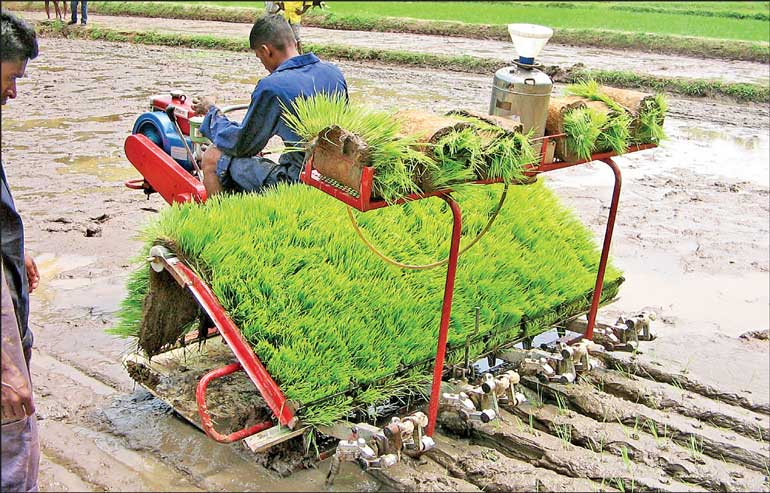Monday Feb 23, 2026
Monday Feb 23, 2026
Tuesday, 6 February 2024 00:29 - - {{hitsCtrl.values.hits}}

 By Athula Jayasekera
By Athula Jayasekera
It is already in corporate talk circles that we should be a part of the global manufacturing chain, as the production dynamics today do not give advantage to any country to manufacture one single product. If so, where can we have the comparative advantage, in what kind of components or accessories of industrial products can we specialize on? Do we have the know-how and capacity to do so?
Since time immemorial, Sri Lanka right throughout has been an agricultural country. Paddy cultivation can be tracked down to beyond 100 BC, and continues to date with changes in the inputs, processes and methods. The land use had been mainly for agriculture throughout history. To date this sector has been able to ensure food security by supplying the basic foods despite the increase in population. At one time there had even been a surplus production according to historical records. With the surplus and the visionary thinking of a few kings, Sri Lanka was engaging in export and entrepôt trade of agricultural outputs such as paddy, for some time. This entrepot trade and the export of rice and spices would have given the country the much-needed purchasing power at that time.
After James Taylor’s success with the plantation of ‘Tea’, the country’s import requirements were successfully looked after by tea, and ably supported by rubber and coconut for more than 150 years. Due to poor and irrational decisions made by those in power in certain eras these two sectors, (agriculture and plantation) started having serious issues. Yet, these are the sectors that need more attention. Agricultural exports still play a vital role in economic development, contributing significantly to the export income. Certainly, new technologies to enhance productivity and quality need to be introduced. Sri Lanka should manage its agricultural resources efficiently to achieve a higher production, embracing new technology to overcome inherent structural weaknesses This would be costly and time consuming, yet, there is no other option but to invest on such high-tech equipment. This is where the Sri Lankan Banks can come together to assist the ailing industries. The country’s land is fragmented too much, including the land used for agriculture. Family obligations and the absence of a system to divide land among the family members had resulted in this unwarranted fragmentation. Hence, there are many smallholder farmers. A need for defragmentation (without affecting land ownership) or technology sharing with a system of target-oriented production planning has to be introduced, without hurting individual farmers. Small agricultural plots should be annexed to each other to make a large area for cultivation. This would give the cost advantage to the industry as cultivating large land tracts would be more advantageous than cultivating small plots.
Agriculture has set and influenced the culture of Sri Lanka. It has introduced many traditions that are being followed to date. Most of the Sinhala and Tamil New Year traditions developed with the expansion of agriculture in the country so that the country has a rich cultural heritage.
Sri Lanka lies near the Equator and enjoys a tropical climate considered ideal for agriculture. Around 30% of the population is employed in the agricultural sector, and for ages rice has been considered as the staple food of the people. Agriculture is the primary income source for the majority of the rural poor in the country. These less educated gullible farmer community that form an aging workforce, is often the victims of exploitation due to non-availability of a fully-fledged rural financial system and lack of financial literacy. The young adults of the farming community do not show much interest in employment in this sector and therefore the industry is no more lucrative.
The main reason for poor compensation is the high cost of production and the inability to market their produce as the markets are far away from the place of produce. The supply chain plays a vital role, facilitating the supply of the required fertiliser to the farmer and transporting the produce to the markets that are mainly urban and sub urban based.
Sri Lanka receives its annual rainfall from monsoonal and conventional rains. Monsoonal rains are experienced through the Maha and Yala seasons. The Maha season is during the north-east monsoon from September to March in the following year. The Yala season is during the south -west monsoon from May to August. Yet, in the past couple of years the country has been experiencing extreme weather patterns of unseasonal rains, droughts, etc. This has negatively impacted the production of crops and the smooth flow of the agricultural production processes.
Lankan agricultural land is either rain-fed and or irrigated or both. As the country lacks significant deposits of industrial raw material, it must utilise the available resource to the optimum. Arable land is one such natural resource that needs to be optimally utilised. Sri Lanka has a fertile tropical landmass with enormous potential for cultivation and the processing of a variety of crops. Ingrained issues such as, low profitability and productivity has hindered the growth of this industry. These issues need to be addressed using new technology of 4thIR ensuring to provide inputs on time, with improved logistics facilities including, storage and transport along with easy market access for the produce to reach the consumer speedily.
Value addition to the agricultural produce of the country is a must and needs to be encouraged at all times. The investment in value addition processes should be incentivised to attract investors. Similarly, the cost of production ought to be reduced and always be mindful of a hectare as a yardstick. This should be maintained below the pre- determined levels that will encourage the farming community to continue in business.
Technological advances and new developments along with high profitability may attract a new generation of farming fraternity to the industry. The stigmas attached to the job of a farmer could be removed with the new outlook of professionals coming into the sector. This type of change will provide farmers with a sustainable livelihood and a much more prestigious employment opportunity. Proper planning and concern for environmental degradation will avoid the depletion of natural resources.
(The writer is a founder member and a past President of the Board of Management of TMC and first Chairman of TMC Colombo. He is also an ex-Banker)